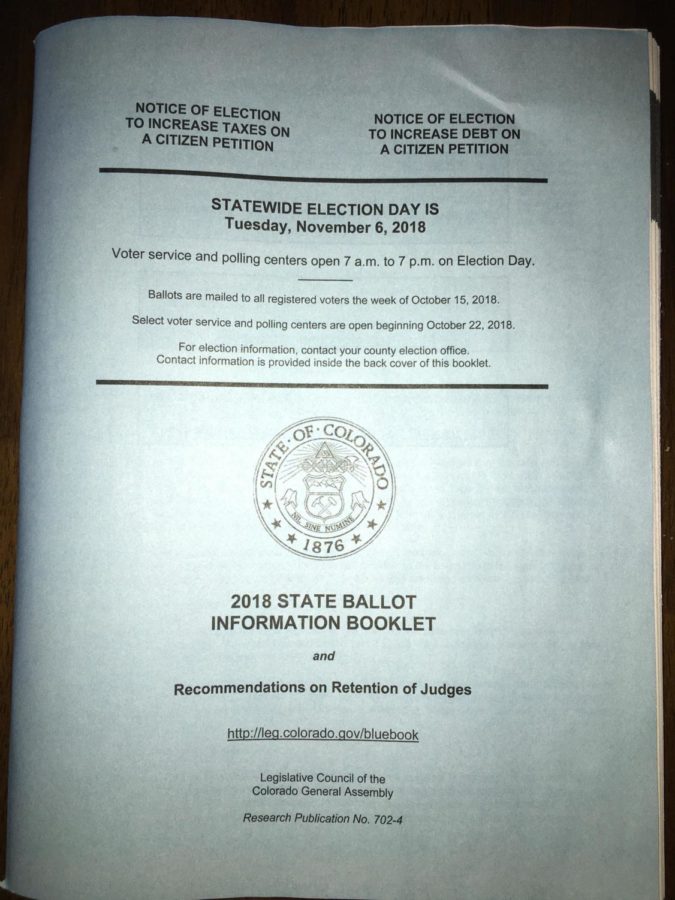Proposed Changes to Local and State Laws
The 2018 State Ballot Information Booklet has been mailed to many registered voters across Colorado. The Booklet contains information on most parts of the election and recommendations on the retention of judges.
The 2018 Midterm election season is in full swing. The radio, television, and even the mail are reaching their saturation points with political information being thrown at the voters. Just because it appears in the media, however, does not mean it is completely true. It is imperative that the voters are able to understand the bills and amendments that are being proposed for themselves and to make an educated choice from there.
While not all of the students in Rocky are eligible to vote, it is still important to know what is happening in the area because new laws and changes to the Constitution can affect everyone. For those who are able to vote, please take the opportunity to make educated decisions and vote for the changes that you wish to see.
The following amendments, propositions, and ballot issues will be summarized in common language in order to create a simplified understanding. The district and town specific ballot issues are not included within this article. The full texts can be accessed through the General Larimer County 2018 Sample Ballot at the following link: https://www.larimer.org/sites/default/files/uploads/2018/2018_general_sample_ballot.pdf.
State of Colorado:
A constitutional amendment is added to the Colorado Constitution and replaces any pre-existing laws that concern the same topic.
A statutory proposition can also be known as a ballot measure and can create new laws, change or repeal existing laws or the Constitution, or approve a bond measure.
Amendment V (Constitutional):
If approved, this amendment would be added to the Colorado Constitution and would reduce the minimum age of a member of the Colorado State Legislature from 25 to 21 years of age.
Amendment W (Constitutional):
The proposed amendment would change the format of Judicial Retention Elections from asking about retention for each candidate to asking the question once per court type.
To see a visual example of the change, follow this link: https://www.9news.com/article/news/voter-guide-2018-amendment-w-election-ballot-format-for-judicial-retention-elections/73-602081008.
Amendment X (Constitutional):
This amendment, if approved, would change the definition of industrial hemp from a constitutional definition to a statutory definition. This means that is removes the meaning of “industrial hemp” from the Colorado Constitution and gives it the same meaning as established in federal and state statutes.
Amendment Y (Constitutional):
Amendment Y would change who the responsibility of drawing congressional districts falls on; taking it away from the State Legislature and putting it on a committee of 12 people with relevant skill sets. Of these 12, ⅓ will be affiliated with Colorado’s largest political party, ⅓ will be affiliated with the second largest political party, and the final ⅓ will not have any affiliation to a political party. The amendment would also limit judicial review to the Colorado Supreme Court, prohibit maps from reducing electoral influence of any particular group (racial, ethnic, religious, etc), and aims to prevent professional lobbyists, federal and state employees, and those with particular interests from influencing the redistricting process.
Amendment Z (Constitutional):
Amendment Z is similar to Amendment Y but concerns state legislative districts rather than congressional districts. The proposed amendment would move the responsibility of redistricting from the State Legislature (Colorado Reapportionment Commission) to a an independent commission made up of ⅓ members from Colorado’s largest political party, ⅓ from the second largest party, and ⅓ that are unaffiliated. The amendment would also change the guidelines surrounding ethics and the selection of commissioners and change the criteria for redistricting state legislative districts.
Amendment A (Constitutional):
This amendment proposes to remove the language in the Colorado Constitution that currently allows involuntary servitude and/or slavery to be used for punishment when convicted of a crime. Current offender work programs in the US and Colorado Justice Systems include prison work programs, probation, and community service.
Amendment 73 (Constitutional):
Amendment 73 aims to increase funding for Colorado Public Schools from grades Preschool-12 by raising taxes on those with taxable incomes over $150,000 per year and setting new assessment rates for properties levied (taxed) by school districts. This will reduce the nonresidential taxation rate from 29 to 24% and the residential rate from 7.2% to 7% in order to prevent the rates from falling much lower, therefore, increasing funding in comparison to the projections of how low the rates could possibly fall.
Amendment 74 (Constitutional):
This amendment would require the government to compensate property owners if laws or regulations reduce the market value of the property. There are various circumstances in which the government’s actions would reduce property value including the use eminent domain, unintended damage to the property, and regulatory taking.
Amendment 75 (Constitutional):
If approved, the amendment would allow other candidates in a political race to accept donations that are five times more than the established limits in the Constitution if one candidate were to contribute more than $1 million to his or her campaign from personal funds.
Proposition 109 (Statutory):
Proposition 109 would use existing revenue to increase the current transportation funding up $3.5 billion in bonds. The bonds would be paid back over the next 20 years. The funding will go to state highway projects across the state and it will be used on other transportation improvements.
Proposition 110 (Statutory):
Proposition 110 would raise the current sales tax rate from 2.9% to 3.52% for the next 20 years in order to increase revenue for Colorado state and local governments to put towards developing transportation. 45% of the funds would go towards the State government, 40% to local governments, and 15% for multimodal transportation projects (mostly sanctioned by local governments). The proposition would also allow the State of Colorado to borrow up to $6 billion through bonds to fund transportation projects and limit the repayment amount to $9.4 billion.
Proposition 111 (Statutory):
Payday loans are loans that are short-term and do not require credit checks, making them easy-to-access for the majority of the population. The annual percentage rate, which includes interest rates and fees, averaged about 129% in Colorado in 2017. Proposition 111 would limit the annual percentage rate to 36% and eliminate the current fee structure.
Proposition 112 (Statutory):
According to the Colorado Oil and Gas Conservation Commission (COGCC), current setback regulations for the oil and gas developments must be at least 500-feet from any occupied building and at least 1,000-feet from any high-occupancy building. Proposition 111 would increase this distance to at least 2,500-feet from any occupied area, water source, or area that has been designated as vulnerable. Currently, the distance requirement can also be waived under certain circumstances but there is no waiver proposal included within Proposition 111. This law would not apply on federal land.
The full texts of the legislative bills, ballot analyses, registered issue committees, and additional information for all of the Colorado Propositions and Amendments can be found at the following link: https://www.sos.state.co.us/pubs/elections/Initiatives/ballot/contacts/2018.html.
Larimer County Ballot Issues:
Larimer County Ballot Issue 1A:
This ballot issue concerns raising taxes annually by about $19,000,000 through a .25% increase in sales taxes and using the new funds to support and treat mental health issues in the Larimer County area through in-person and other delivery methods and to improve current mental health facilities within Larimer County. The proposal will be reviewed each year to ensure that the funds are being allocated appropriately.
The ballot issue failed to pass two years ago during the 2016 voting season. According to the Larimer County Coroner’s annual report, there were 75 deaths by suicide in 2017 and Larimer County still has one of the highest suicide rates in the country. The proposed facility would also include detoxification services.
More information about the proposal can be found on the Mental Health Matters website for Larimer County: https://www.larimercountymentalhealth.info/.
If you are currently 18, you can check your voting status and register using the following link: https://www.larimer.org/clerk/elections.

Karenna Doctor is a Senior at Rocky Mountain High School and is also a staff member of the school literary and arts magazine, The Looking Glass. Outside...













John Robinson • Oct 15, 2018 at 10:44 am
Well done, Karenna! This article is concise and informative. Thank you for making a confusing ballot easy for our Rocky community to understand.